Jocky Allan has passed.
Life is strange, sometimes.
Yesterday I was talking to a friend of mine, we got round to talking about cycling, and with a far away look in his eyes, he reminisced about his first bike;
“my maw pushed the boat out and bought me this beautiful red racer, it had white wall tyres and white transfers on the tubes – JB Allan.”
This morning, I learnt that ‘Jocky’ had died.
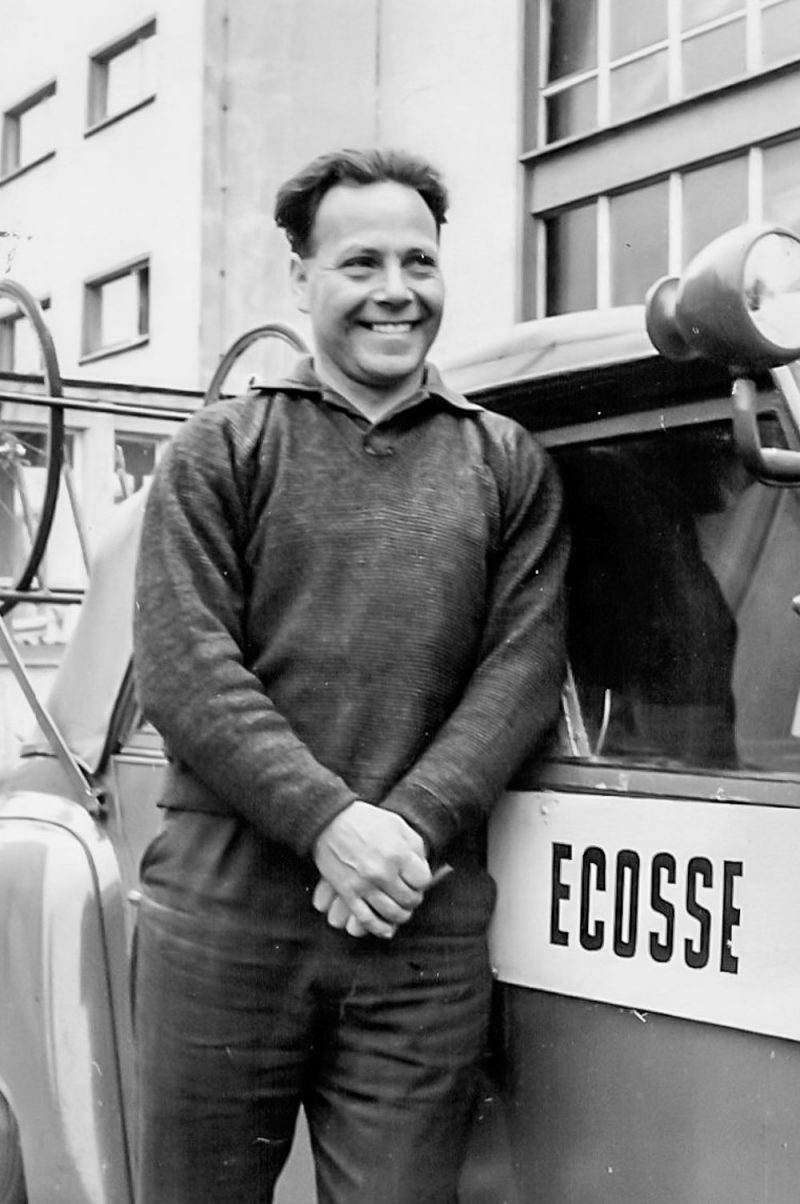
I first eased my fat body over a bike in competition in 1971. Continental racing was beyond my imagination, Merckx and De Vlaeminck were mystical beings who inhabited a world which could only be reached through the pages of Cycling Weekly or International Cycle Sport.
But in Scotland, if you were into the ‘alone and unpaced’ side of the sport, the top team was Jocky’s Velo Sportiv. Joe Summers, Doug McInley and Jim Smillie were the men I looked at in awe as a young Kirkcaldy and District tester.
Jocky and his van were omnipresent as his boys scooped up the individual and team honours most weekends.
I was never close to the man, but we’d usually exchange a few words; if banter was involved, I’d always loose. You had to get up early to get the better of Jocky.
I can’t say much more that, save that in a cycling world that can sometimes be a bit grey, he always added colour.
Ed Hood
* * *
I’m very sad today. When I heard the news about Jocky this afternoon, I kicked myself. For quite a while now I’d been meaning to invite him and his wife to dinner, to chat about things, find out how they and the family are keeping, and to talk about the good old days. Another hard lesson in the dangers of procrastination, as if I needed it.
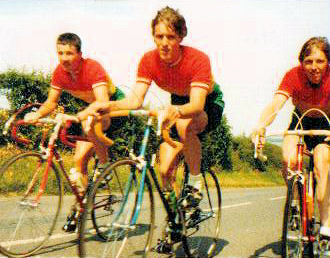
I owe a lot to Jocky – he got me started in cycling, he taught me so much, he made my youth a lot of fun, and he put a great deal into the sport: he was involved in starting the SCU (Scottish Cyclists’ Union), ESCA (the East of Scotland Cycling Association), the White Heather cycling club (which later became the Edinburgh Road Club), and – this is where I came in – the Velo Sportiv cycling club.
I used to be pals with Jock’s youngest son, Wallace – sadly no longer with us either.
Wally and I used to run round to Jocky’s shop in Jane Street – and then later Leith Walk – when we were on our lunch break from school. Wally’s mum Gaye was the first person I knew to have a microwave, in the back of the shop; lunch was made and consumed quickly, so there was as much time as possible to mess around with bike bits. The shop was a haven for bike fans, with great mounds of spares and frames and bolts and gears everywhere; organised chaos.
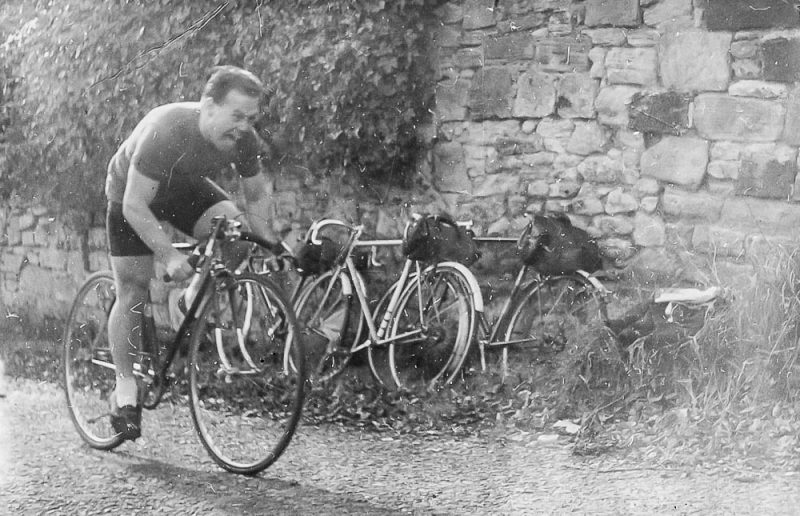
Of course, with Wally already racing, it was only a matter of time before I became interested as well, riding my first race, Jocky’s “Christmas 10” in 1979, recording 29:44. I thought this was pretty good, apart from being passed by a giant polar bear! (the race was also a fancy dress for those that wanted).
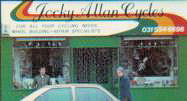
My dad had put a wheel in to Jock’s shop 20 years previously, but had subsequently forgotten about it.
For a joke, he went in to the shop with me one day and asked Jocky when it would be ready.
Always up for a laugh, Jocky made a play of searching through the huge pile of wheels in front of him, kidded on he found my dad’s wheel, and said “Ah yes, it’s just on the jig the now – be ready Thursday.“
In all the time I knew Jocky, I never knew him to be angry – loud? yes, cutting? yes, funny? oh yes. He was a great joker, always ready with his big round smile and cheeky quips.
Attempting to straighten an already fully-tightened seat post once, he kidded on he’d made a difference to the position; “That’s the difference between an expert and an arse” he said to Wally in all seriousness, whilst we crumpled in fits of laughter. “Yer arse” we replied, saying back one of Jocky’s favourite phrases.
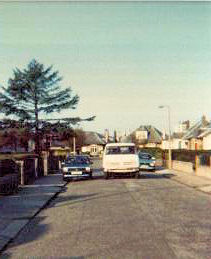
Most of my teenage years were spent cycling around with my pals Wally, Derek, Garry and Neil.
Jocky coached us, and it was always great advice for young lads starting out: “Don’t copy the Pros’ gear ratios, copy the Pros’ leg speed.”
He engrained in us the ability to pedal fast, which when you were riding on restricted schoolboy gears, was vital of course. But it also stood us in good stead when we were older too. We “got” suplesse, we understood how it benefitted us, and we practised it – a lot.
Jocky used to take us all around the country in his old white transit van every weekend. I remember travelling to Aberdeen, to Glasgow and to West Ferry, to Newcastle and as far as Boroughbridge, having battles with Graeme Obree for 1st Junior in 10’s and 25’s, when really all that mattered was to beat my pals and then lord it over them on the journey home in the back of the transit amongst the bikes.
Jocky would tell us stories in the van all about when he took Scottish teams to the Peace Race – and won stages!
He was very proud of the previous generation of lads he coached: Jim Smillie, Frank Anderson, Ken Klessa, Ran Shenton, and before them Brian Temple, Ronny Boa and John McMillan.
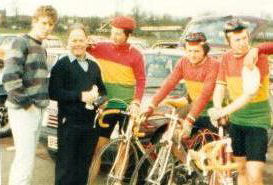
Once, when I was “helping” in the shop on a Saturday morning, a German lady came in looking for something. Jocky started talking to her in fluent German – something I didn’t know he could do!
Later, when the shop was closed, he sat me down in the back shop with a cuppa and told me how he was one of the first Commandos in the war: he was in the Parachute Regiment and took part in Operation “Market Garden” in September 1944, which took place in the area near Arnhem, in Holland. I sat there, totally spellbound as Jocky told me about “Market Garden”, which was one of the boldest plans of World War Two.
Thirty thousand British and American airborne troops were to be flown behind enemy lines to capture the eight bridges that spanned the network of canals and rivers on the Dutch/German border.
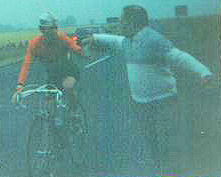
However, it didn’t turn out quite like that: not enough planes, poor radio equipment, and very well organised German infantry and panzer divisions meant that the operation failed, and the Parachute Regiment left behind nearly 1,500 dead and more than 6,500 prisoners, many badly wounded. Jocky was one of those prisoners, and spent the remaining 10 months of the war in a POW camp. It was here that he learned German.
There are a million stories I could write here, about our many trips to the Tour of the Borders, to Harrogate, about him “making” me ride 12 hour time trials “for the team”, and about Jocky’s absolute and total love for his family; for Gaye, Wally, Michelle, and Corinne.
Jocky never took them – or anyone – forgranted. He really appreciated people and the things they did for him. He was a lovely, funny, kind man. I’ll miss him very much. And sorry about that dinner JB.
Jocky was 88, but if he was here he’d tell you he was 58 – he said he was 58 all the time I knew him!
Martin Williamson



